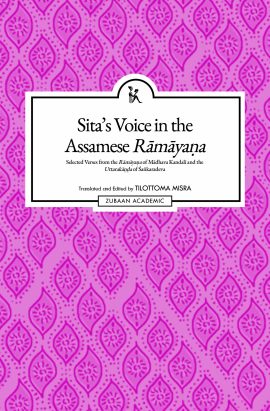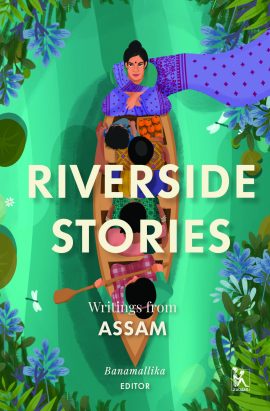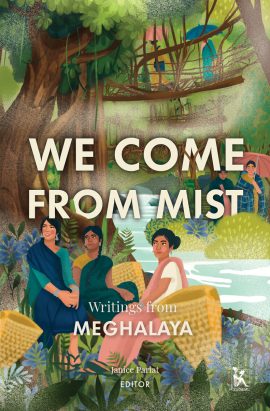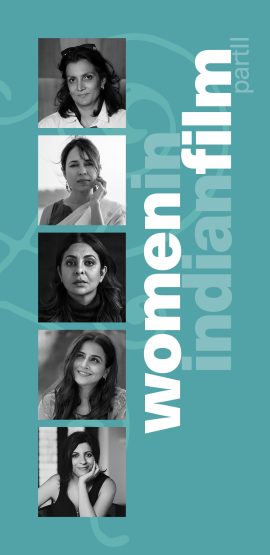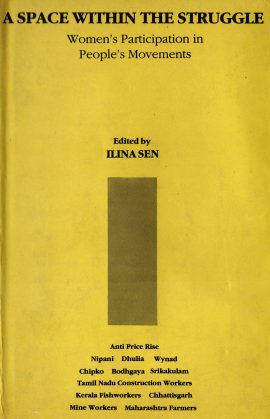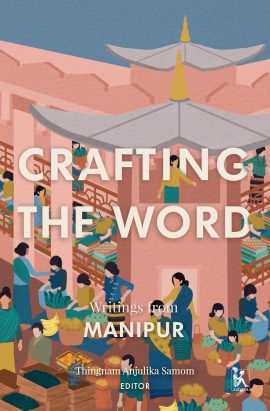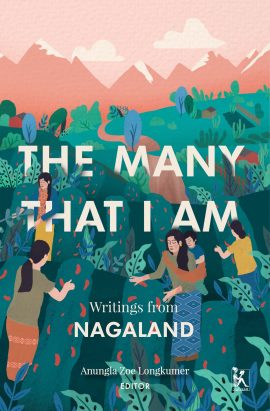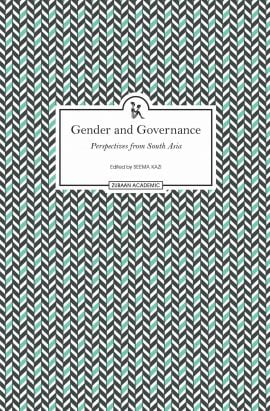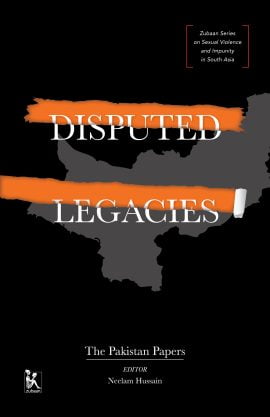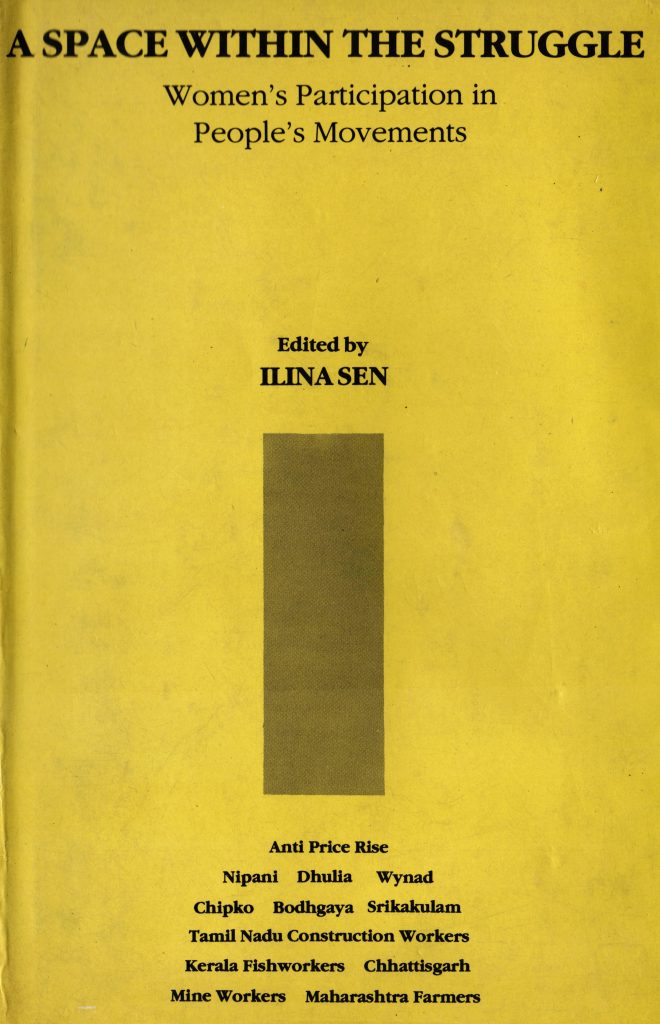No products in the cart.
Return To Shop
Log in / Sign in
Login
Register
Filter by price
Sita’s Voice in the Assamese Rāmāyaṇa
₹ 560 – ₹ 695Select format This product has multiple variants. The options may be chosen on the product pageBooks, Books from the North East, Books from the North East, e-Books, New Releases, New Releases, Non-Fiction, Non-Fiction
Riverside Stories: Writings from Assam
Rated 5.00 out of 5
₹ 480 – ₹ 595Select format
This product has multiple variants. The options may be chosen on the product page Books, Books from the North East, Books from the North East, e-Books, Fiction, Fiction, New Releases, New Releases
We Come From Mist: Writings from Meghalaya
₹ 395 – ₹ 595Select format This product has multiple variants. The options may be chosen on the product pageHomeward: Towards a Poetics of Space
₹ 550 – ₹ 1,200Select format This product has multiple variants. The options may be chosen on the product pageBooks, Books from the North East, Books from the North East, e-Books, Fiction, Fiction, New Releases, Non-Fiction, Non-Fiction
The Inheritance of Words: Writings from Arunachal Pradesh
₹ 350 – ₹ 495Select format This product has multiple variants. The options may be chosen on the product pageFeminist Terrains in Legal Domains: Interdisciplinary Essays on Women and Law in India
₹ 300 – ₹ 325Select format This product has multiple variants. The options may be chosen on the product pageA Space Within the Struggle: Women’s Participation in People’s Movements
₹ 325 – ₹ 475Select format This product has multiple variants. The options may be chosen on the product pageBooks, Books from the North East, Books from the North East, e-Books, Fiction, Fiction, New Releases, New Releases, Non-Fiction, Non-Fiction
Crafting the Word: Writings from Manipur
₹ 248 – ₹ 495Select format This product has multiple variants. The options may be chosen on the product pageBooks, Books from the North East, Books from the North East, e-Books, Fiction, Fiction, New Releases, New Releases, Non-Fiction, Non-Fiction
The Many That I Am: Writings from Nagaland
₹ 350 – ₹ 495Select format This product has multiple variants. The options may be chosen on the product pageGender and Governance: Perspectives from South Asia
₹ 398 – ₹ 795Select format This product has multiple variants. The options may be chosen on the product pageDisputed Legacies: The Pakistan Papers
₹ 425 – ₹ 850Select format This product has multiple variants. The options may be chosen on the product pageSita’s Voice in the Assamese Rāmāyaṇa is a translation of select verses from the Assamese Saptakāṇḍa Rāmāyaṇa of Mādhava Kandalī, Śaṅkaradeva and Madhavdeva, written between the 14th-15th centuries CE. This vernacular rendition of the Vālmīki Rāmāyaṇa has been translated with a scholarly introduction by Tilottoma Misra. The selected verses represent a distinctive creative rendition of the Vālmīki text from the region of Assam by adding new emotional and philosophic dimensions to it. Especially in the Uttarakāṇḍa ascribed to Śaṅkaradeva, Sita’s voice acquires a unique quality in her final rejection of Rāma thereby expressing her ultimate disillusionment with him, the much-acclaimed paragon of all virtues.
“Others may praise him for all his deeds. But Death incarnate is Rāma for me.”
“I have never heard of a husband more unkind than he. O how can I look upon him again with love and pride?”
—Uttarakāṇḍa of Śaṅkaradeva
______________________________________________________________________________________
TILOTTOMA MISRA writes on literatures from Northeast India, particularly Assam, and on gender and the nationality question. She is author of Swarnalata (1991, English translation 2012, Zubaan), Louhitya Sindhu (1997), Kameikhar Ghar (2013, English translation High Wind, 2020, Zubaan), Literature and Society in Assam: A Study of the Assamese Renaissance 1826-1926 (1987) and editor of the Oxford Anthology of Writings from North-East India (2011). She has translated and edited Gunabhiram Barua’s Ramnabami-Natak (2007). She was awarded the Ishan Puraskar by Bharatiya Bhasha Parishad for Swarnalata, and the Lummer Dai Award by the Arunachal Pradesh Literary Society and the Assam Sahitya Sabha for Kameikhar Ghar.
Stories abound in Assam’s fields, ponds, rivers, forests, hills and cities. Most of its people wear each other’s clothes, eat each other’s food and speak each other’s languages. Diversity and amalgamation are the primarily identifiable elements of people from Assam. Yet, everyday patriarchy and politics of boundaries have resulted in so much confusion and conflict. Thankfully, we are witnessing emerging voices of people who experience life differently because of their own identities and locations and propose an inclusive space for us all. The women and transpeople who have contributed to Riverside Stories come from this diversity and bring their stories of multiple experiences from Assam to the world. This collection of fiction, non-fiction, poetry and visual stories, puts on record the experiences of the self, the very personal, within homes, in the environment, with politics, and with disappointments, desires, hopes and memories for a future. In putting together this anthology, it is our hope that we have complicated—more than it already is—the notion of whose and which stories can be told.
______________________________________________________________________________________
BANAMALLIKA is mostly a disheartened feminist activist from Assam. She has used storytelling as a tool for questioning power in her personal life and professional work. To her ever-expanding array of activities, she has added drawing, filmmaking, entrepreneurship, gardening, theatre, cooking, research, writing and, very recently, playing with clay. She draws her sustenance from the feminist movement and its solidarity. She is currently fantasising about not having to write another proposal or project report and living on a farm on a foothill by a spring.
This book is an offering—of prose, poetry, musical lyrics, and visual art—by the women of Meghalaya in Northeast India. One of the smallest states in the country, but also, one of the most beautiful, Meghalaya is blessed with landscapes that mesmerize and inspire song and story. In the not-so-distant past, though, it has also seen political turbulence and civil unrest, and many of the works here capture that quiet unease—in homes and kitchens, in market-places and public taxis. Yet this anthology is also a celebration. Of wisdom and joy, of queerness and sisterhood, of mothers and feminine bodies, of home and hearths. Of voices new and established. Brought together in one volume by Janice Pariat, a novelist and poet from these hills. Here, we sit together around a fire, and sing, and weep, and dance, and tell stories. We dream of where we came from, the hills, the mist, and dream of what else we are still yet to discover.
Contributors: Amanda Basaiamoit | Amanda Christie Tongper | Amrita Dutta | Angel Konthoujam | Anjum Hasan | Antara Roy Oruganti | Balaiamon Kharngapkynta | Bymonmiralda B Lato | Careen Joplin Langstieh | Cheryl Rynjah | Clarissa Giri | Daiaphi Lamare aka Reble | Daiarisa Rumnong | Daribha Lyndem | Esther Larisa David | Evangelene Nongkhlaw | Fileona Dkhar | Jobeth Ann Warjri | Karen L. Donoghue | Lahundashisha Kharshiing | Longnam Wanbiang Kharpuri | Maya Mawlong | Menty Jamir | Reeju Ray | Samanda Nora Pyngrope | Satarupa Paul | Saweini Laloo
JANICE PARIAT is the author of Boats on Land: A Collection of Short Stories and Seahorse: A Novel. She was awarded the Sahitya Akademi’s Young Writer Award and the Crossword Book Award for Fiction in 2013. Her novella The Nine Chambered-Heart, bestselling in India, was published in the UK and in ten other languages including Italian, Spanish, French, and German. Her most recent work Everything the Light Touches has been widely acclaimed. She lives between Shillong and New Delhi with a cat of many names.
These ebooks are DRM-free!
Following on the stories in our earlier Women in Indian Film collection, comes this vibrant new mini-series that focuses on the work of the next generation of film practitioners: Zoya Akhtar, Vidya Balan, Rima Das, Priya Seth and Shefali Shah. Under the editorship of the leading film scholar, Nasreen Munni Kabir, writers Kaveree Bamzai, Charu Gargi, Udita Jhunjhunwala, Namrata Joshi and Nandini Ramnath bring to light new acting styles, editing choices and directorial innovations that put women in Indian cinema at the heart of change and experimentation today.
NAMRATA JOSHI is an independent journalist and film critic. A consulting editor with The New Indian Express and freelance film critic with Screen International, she works as associate programmer (India) for the Indian Film Festival of Los Angeles (IFFLA). In 2004 she won the National Award for Best Film Critic in India. Among her published work is Reel India: Cinema Off the Beaten Track (2019).
UDITA JHUNJHUNWALA is an entertainment, culture and lifestyle writer, film critic and author. Formerly Entertainment Editor of Mid-Day and Hindustan Times, her writings have also appeared Vogue, Screen International, Mint, Scroll.in, Firstpost.com, The Hindu and others. A member of the Film Critics Guild (India), and a festival curator, Udita was a contributing author to Women in Indian Film (Zubaan 2008) and Bollywood’s Top 20 Stars.
NANDINI RAMNATH is a film critic and journalist. She has worked with The Indian Express, NDTV, Time Out Mumbai, Mint and Scroll.in.
KAVEREE BAMZAI was editor of India Today and has worked in The Times of India and The Indian Express. She is the author of The Three Khans and The Emergence of New India and No Regrets: The Guilt-free Woman’s Guide to a Good Life, and several monographs and essays on Indian cinema. She is a TEDEx speaker, and presenter of Tiffin Talks, a video magazine on books and cinema.
CHARU GARGI is Founder member of Mediastorm, India’s first women’s film collective, a documentary film maker, an author and academic. She has made video lectures for the Electronic Media Production Centre, Indira Gandhi National Open University and taught in the School of Media and Culture Studies, Tata Institute of Social Sciences.
In Homeward, Soibam Haripriya brings together writers, artists, poets and photographers to question presumptions of home, the idea of a homeland and, by extension, the nation. Articulating and imagining the meanings of home, one’s own or those of others, is often an act of confronting one’s vulnerability. Metaphorical or real, homes are necessarily messy worlds that inevitably collide and telescope into each other as their geographical boundaries often intersect and overlap. The contributors to this volume, in their different ways, upend the idea of home as a unit of stability, familiarity and familial-ity, emptying out its significance as a place of nostalgic refuge to which one can always return. The ostensibly common universal idea of home is often unhinged, they show, by the conditions of violence that underpin relations within that space. Focusing largely on the Northeastern region, often bound together in some way, ethnically and geographically, this anthology illuminates how political climate as well as geographic sites transform homes. How then may we re-imagine home when its significance as a space and place of refuge loses meaning. Homeward engages with the boundaries and constraints imposed by messy cartographies and attempts to evoke a poetics of space through the act of writing.
Contributors: Agastaya Thapa | Amorette Grace Lyngwa | Amrapali Basumatary | Bhagwati Prasad | Gayatri Thangjam | Janice Pariat | Kumam Davidson Singh | Lapdiang Artimai Syiem | Leki Thungon | Ma Thida | Malsawmi Jacob | Mamang Dai | Mouma Mog | Pandora | Parismita Singh | Prashansa Gurung | Priyadarshini Moirangthem Chanu | Rubani Yumkhaibam | Rongnyoo Lepcha | Mongfing Lepcha | Shalim M Hussain | Soibam Haripriya | Thejakhrienuo “Thej” Yhome | Vishü Rita Krocha
SOIBAM HARIPRIYA is a poet and researcher. Her work has appeared in several anthologies including Centrepiece: New Writing and Art from Northeast India (2017), published by Zubaan, 40 Under 40: An Anthology of Post-Globalisation Poetry (2016) and A Map Called Home (2018). She has also been published in Muse India (May-June 2019), Poetry at Sangam (July 2019) and the Sahitya Akademi journal, Indian Literature. She is presently a postdoctoral fellow at the Department of Conflict and Development Studies, Ghent University, Belgium.
A first of its kind, this book brings together the writings of women from Arunachal Pradesh in Northeast India. Home to many different tribes and scores of languages and dialects, once known as a ‘frontier’ state, Arunachal Pradesh began to see major change after it opened up to tourism and once the Indian State introduced Hindi as its official language. In this volume, Mamang Dai, one of Arunachal’s best known writers, brings together new and established voices on subjects as varied as identity, home, belonging, language, Shamanism, folk culture, orality and more. Much of what has been handed down orally, through festivals, epic narratives, the performance of rituals by Shamans and rhapsodists, revered as guardians of collective and tribal memory, is captured here in the words of young poets and writers, as well as artists and illustrators, as they trace their heritage, listen to stories and render them in newer forms of expression.
Contributors: Ayinam Ering | Bhanu Tatak | Chasoom Bosai | Doirangsi Kri | Gedak Angu | Gyati T. M. Ampi | Ing Perme | Jamuna Bini | Karry Padu | Kolpi Dai | Leki Thungon | Mamang Dai | Millo Ankha| Mishimbu Miri | Nellie N. Manpoong | Ngurang Reena | Nomi Maga Gumro | Omili Borang | Ponung Ering Angu | Rebom Belo | Rinchin Choden | Ronnie Nido | Samy Moyong | Stuti Mamen Lowang | Subi Taba | Takhe Moni | Tine Mena | Toko Anu | Tolum Chumchum | Tongam Rina | Tunung Tabing | Yaniam Chukhu | Yater Nyokir
MAMANG DAI is a poet and novelist. A former journalist, she has worked with World Wildlife Fund in the Eastern Himalaya Biodiversity Hotspots programme. Her first book, Arunachal Pradesh: The Hidden Land, received the State Verrier Elwin Prize. She is a recipient of the Padma Shri (Literature and Education) and the Sahitya Akademi Award. She currently lives in Itanagar, Arunachal Pradesh.
The essays in this volume explore the relatively new field of women and law from interdisciplinary, feminist perspectives and help to develop an understanding of feminist legal studies in India. As a collection, the book offers insights about women and law as addressed by feminists from the standpoint of both legal and non-legal disciplines. Individually, the different essays explore the legal terrain through historical and cultural analyses of issues such as women’s human rights, gender discrimination, feminist legal scholarship, prostitution, conjugality and the representation of female outlaws in cinema. This varied and contextualised approach explodes the understanding of law as an objective, external, neutral truth. Instead, each writer lays open the contradictory nature of law and shows how it frequently becomes a site of political and ideological struggle.
RATNA KAPUR is an advocate, an activist researcher and a Visiting Professor of Law at Queen Mary University of London. She is co-founder of the Centre for Feminist Legal Research, Delhi, and was formerly Visiting Faculty at the National Law School of India University in Bangalore, Professor at Jindal Global Law School in Delhi, and Senior Faculty member at the International Global Law and Policy Institute at Harvard Law School. She also serves on the international advisory boards of the academic journals Legal Studies and Signs: Journal of Women in Culture and Society, and has written widely on the subject of women and law. Her other publications include Gender, Alterity and Human Rights: Freedom in a Fishbowl (2018), Makeshift Migrants and Law: Gender, Belonging and Postcolonial Anxieties (2014), Erotic Justice: Law and the New Politics of Postcolonialism (2005), and the co-authored volume Subversive Sites: Feminist Engagements with Women and Law (1996).
Popular representations of the women’s movement in India have created many misconceptions about its size and scope—from the assertion that the movement relates exclusively to urban, middle-class women, to the claim that there is no ‘mass women’s movement’ to speak of. Debates within the movement itself take in these issues, but go one step further in posing a different set of related questions: what, if any, is our definition of a women’s movement? How far has the movement been able to address the issues of caste and class? What has been the relationship between ‘feminism’, non-party, autonomous women’s groups and the left? How far have activists within the movement been able to build a theoretical perspective, to conceptualize issues that tie in at the base of the struggle? What, in other words, has been the ideology of the movement?
The essays in this collection address these questions both directly and indirectly. Written by activists from within the different movements, as well as by researchers, they deal with popular movements over the past few decades in which women have participated in large numbers. The ways in which such movements have had to define struggles and issues to ‘accommodate’ women in their ranks have charted out new dimensions for women’s struggles in India. These dimensions have not only gone beyond existing definitions of ‘feminism’—a concept that has acquired a value-loaded connotation of being ‘narrow’—but have also exploded the common left standpoint that women’s issues do not matter in larger struggles against class exploitation. It is argued here that an understanding of the nature of these struggles becomes important in order to gain a perspective on the women’s movement that is more truly representative of the aspirations of the generality of Indian women than most currently available feminist theory.
ILINA SEN was a professor of sociology, trade union activist and President of the Indian Association of Women’s Studies (IAWS), as well as a faculty member at the Mahatama Gandhi Antarashtriya Hindi Vishwavidyalya, Wardha, and the Advanced Centre for Women’s Studies at the Tata Institute of Social Sciences, Mumbai. She was also a Senior Fellow in the Nehru Memorial Library, and was closely associated with women’s and mine-workers’ movements, such as with the Chhattisgarh Shramik Sangh in Madhya Pradesh. Her other books include Inside Chhattisgarh: A Political Memoir (2014) and Sukhvasin: The Migrant Woman of Chhattisgarh (1995). She was affiliated both with the Indian Council for Social Science Research and the Centre for Women’s Development Studies, and published on demography, women’s work, and the theory and practice of the women’s movement in India.
Manipur has a rich tradition of folk and oral narratives, as well as written texts dating from as early as in 8th Century AD. It was however only in the second half of the twentieth century that women began writing and publishing their works. Today, women’s writing forms a vibrant part of Manipuri literature, and their voices are amplified through their coming together as an all-woman literary group. Put together in discussions and workshops by Thingnam Anjulika Samom, Crafting the Word captures a region steeped in conservative patriarchy and at the centre of an armed conflict. It is also a place, however, where women’s activism has been at the forefront of peace-making and where their contributions in informal commerce and trade hold together the economy of daily life.
Contributors: Arambam Ongbi Memchoubi, Aruna Nahakpam, Ayung Tampakleima Raikhan, Bimabati Thiyam Ongbi, Binodini, Chongtham (o) Subadani, Chongtham Jamini Devi, Guru Aribam Ghanapriya Devi, Haobam Satyabati Khundrakpam ongbi, Haobijam Prema Chanu, Koijam Santibala, Kshetrimayum Subadani, Kundo Yumnam, Lairenlakpam Ibemhal, Moirangthem Borkanya, Mufidun Nesha, Natalie Nk, Nee Devi, Nepram Maya Devi, Ningombam Sunita, Ningombam Surma, RK Sanahanbi (Likkhombi) Chanu, Sanatombi Ningombam, Sanjembam Bhanumati Devi, Satyabati Ningombam, Tonjam Sarojini Chanu, Yuimi Vashum
Translators: Akoijam Sunita, Bobo Khuraijam, Kundo Yumnam, L. Somi Roy, Natasha Elangbam, Paonam Thoibi, Sapam Sweetie, Shreema Ningombam, Soibam Haripriya, Sonia Wahengbam, Thingnam Anjulika Samom
THINGNAM ANJULIKA SAMOM is an independent journalist, writer and translator based in Imphal, Manipur. Her journalistic writing focusing on gender, con ict and developmental issues in Manipur has been published in many online and print publications in India as well as outside the country. She is the recipient of the Laadli Media Award for Gender Sensitivity 2010–11 (Eastern Region). She also translates literary works from Manipuri to English and was given the Katha Award for Translation in 2004. A few of her poems are part of the anthology Centrepiece (2017) published by Zubaan.
A grandmother’s tattoos, the advent of Christianity, stories woven into fabrics, a tradition of orality, the imposition of a ‘new’ language, a history of war and conflict: all this and much more informs the writers and artists in this book. Filmmaker and writer Anungla Zoe Longkumer brings together here, for the first time, a remarkable set of stories, poems, first-person narratives and visuals that reflect the many facets of women’s writing in Nagaland.
Written in English, a language the Nagas — who had no tradition of written literature — made their own after the Church came to Nagaland, each piece speaks of women’s many journeys to reclaim their pasts and understand their complex present.
Contributors: Abokali Jimomi, Ahikali Swu, Aniho Chishi, Anungla Zoe Longkumer, Avinuo Kire, Beni Sumer Yanthan, Dzuvinguno Dorothy Chasie, Easterine Kire, Em Em El, Emisenla Jamir, Eyingbeni Humtsoe-Nienu, Hekali Zhimomi, Iris Yingzen, Jungmayangla Longkumer, Kutoli N, Licca Kiho, Limatola Longkumer, Manenjungla Aier, Marianne Murry, Moaso Aier, Narola Changkija, Neikehienuo Mepfhüo, Nini Lungalang, Phejin Konyak, rōzumarī saṃsāra, Sirawon Tulisen Khathing, Metongla Aier, Talilula, Temsula Ao, Thejakhrienuo Yhome, Theyie Keditsu, Vishü Rita Krocha.
ANUNGLA ZOE LONGKUMER can best be described as a free individual discovering her way through creative pursuits in music, writing, filmmaking, and folk traditions. Having travelled and lived outside Nagaland during most of her life, she is currently based in Dimapur, Nagaland, where she freelances doing some content editing, music and filmmaking. She is the author of Folklore of Eastern Nagaland (2017), that comprises translations of folktales, folk songs and real-life accounts, collected from the six tribes who inhabit the more remote districts of Eastern Nagaland.
This book examines the structures of governance as they impact women in five conflict zones in South Asia: Swat in Pakistan, the Chittagong Hill Tracts in Bangladesh, the Northern Province in Sri Lanka, and Kashmir and Manipur in India.
Despite their different historical and political contexts, the five studies included here throw up some common patterns. War and conflict have weakened and eroded existing formal structures and institutions of governance. New formations, whether made up of militant groups, or more ‘secular’ state institutions like armies, do not see women as rights-bearing actors. Further, the authors argue, the impact of war, conflict, settlerism and militancy can make state structures more distant and sometimes incomprehensible to citizens, leaving women’s specific gender concerns unaddressed.
Taken together, the essays show that women’s relationship with governance institutions is complex, and combines dependence on such institutions with the challenge of dealing with new forms of patriarchy that take root as structures transform and change. The gendering of governance policy and practice therefore, is of crucial importance.
CONTRIBUTORS: Amena Mohsin | Delwar Hossain | Nazish Brohi Saba Gul Khattak | Malathi De Alwis | Udhayani Navaratnam | Nima Lamu Yolmo | Shaheena Parveen | Ayesha Parvez | Seema Kazi
The Sexual Violence and Impunity in South Asia research project (coordinated by Zubaan and supported by the International Development Research Centre) brings together, for the first time in the region, a vast body of knowledge on this important – yet silenced – subject. Six country volumes (one each on Bangladesh, Nepal, Pakistan, Sri Lanka, and two on India) comprising over fifty research papers and two book-length studies detail the histories of sexual violence and look at the systemic, institutional, societal, individual and community structures that work together to perpetuate impunity for perpetrators.
Disputed Legacies focuses on Pakistan, examining law, pedagogy, medical practice and the situations that arise when ‘secular’ law comes into conflict with traditional practice and belief. The contributors to this volume trace the often-troubled interaction between the state and its women citizens and examine the structures and social systems that enable impunity for perpetrators of sexual violence to gain strength.
CONTRIBUTORS: Sahar Zareen Bandial | Nazish Brohi | Iftikhar Firdous | Huma Qurban Fouladi | Neelam Hussain | Hooria Hayat Khan | Zainab Zeeshan Malik | Noreen Naseer | Zahaid Rehman | Fahmida Riaz | Rubina Saigol | Zahra Shah | Sarah Zaman | Afiya Shehrbano Zia | Maliha Zia
Categories
Filter by
Product tags
academic
AFSPA
Bangladesh
caste
conflict
culture
Dalit women
e-essays
feminism
feminist
feminist fiction
Fiction
gender
gender studies
health
history
impunity
India
Kashmir
legislation
Literary Fiction
Memoir
Nagaland
New Editions
Non-Fiction
Northeast India
Pakistan
Poetry
sexual violence
Short Stories
sociology
South Asia
state impunity
SVI
SVI Project
Top Ten
translation
violence
violence against women
warehouse wonders
women writer
women writers
young zubaan
zubaanbooks
Zubaan Classics
Contact Us
© Zubaan 2019. Site Design by Avinash Kuduvalli.
Payments on this site are handled by CCAvenue.

